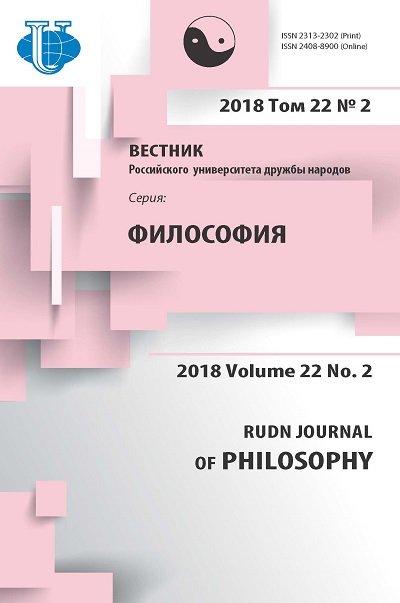The epistemological glaucoma and psematical paradox (autological feature of truth and heterological feature of false)
- Authors: Pavlenko AN1
-
Affiliations:
- Institute of Philosophy of RAS
- Issue: Vol 22, No 2 (2018)
- Pages: 158-167
- Section: Ontology and epistemology
- URL: https://journals.rudn.ru/philosophy/article/view/18711
- DOI: https://doi.org/10.22363/2313-2302-2018-22-2-158-167
- ID: 18711
Cite item
Full Text
Abstract
In this paper is considered the main arguments of the deflationary concept of truth: the approaches of A. Tarski, W.V. Quine, H. Putnam and some others. Here are presented two representative examples of the elimination of truth as the value of the proposition: the concept of “languages games” by L. Witgenstein and “constructive empiricism” by B. van Fraassen. It is revealed that the statement “there are no true statements” is self-predictive and leads to absurdity. It is demonstrated that the elimination of “truth” from epistemology will require, with necessity, the elimination of “false” also. It is shown, that when we try to get answer on the question “Can a “false sentence”, understood as a “not true” sentence, i.e. р, has the same denotation on which it denotes (not be true)” a paradox arises, which calls “psematic” from the Greek word ψέματα (false). The essence of the paradox is that “every false sentence denotes false” denotes every false sentence denoting false, if and only if, “every false sentence denoting false” is not every true sentence denoting the truth. The result is: a) if “every false sentence denoting false” itself is not every true sentence denoting the truth, then, by the definition of “every false sentence denoting false”, it is not a sentence denoting false . And vice versa: b) If “every false sentence denoting false” itself is every true sentence denoting the truth, then, consequently, it is “every false sentence denoting false” and it is a sentence denoting false. In any case, it turns out that the proposition “false sentences denote false”, simultaneously have the sign that they designate and do not have it. It was found that “truth” has an autological nature, and “false” has heterological one.
About the authors
A N Pavlenko
Institute of Philosophy of RAS
Email: anpavlenko@mail.ru
- 12/1 Goncharnaya Str., Moscow, 109240, Russia
References
- Anisov AM. The formal epistemology. The problems of Reality and Truth. Epistemology: the perspectives of evolution. М.: Kanon+, 2012. (In Russ).
- Aristotle, Metaphysics // Collected works in 4 volumes, Moscow, 1976, V. 1, 550 p. (In Russ).
- Armour-Garb, B. ‘Horwichian Minimalism and the Generalization Problem’, 2010. Analysis 70 (4): 693-703.
- Ayer A.J. ‘The Criterion of Truth’ - Analysis, v. 3, No. 3, Jan. 1936. Pp. 28-29.
- Ayer A.J. Language, Truth, and Logic. 2nd ed. L., 1946. Ch. 5.
- Fraassen BC. van. The Scientific Image, Oxford: Clarendon Press, 1980.
- Fraassen BC. van. Empiricism and the Philosophy of Science', in Churchland and Hooker, 1985, pp. 245-308.
- Frege G. Sense and reference. The Philosophical review. Volume 57, Issue 3 (May 1948).
- Horwich P. Truth. Oxford, 1998, 176 p.
- Pavlenko A. The Limits of Intersubjectivity (A Critical View on the Communicative Ability for the justification of Knowledge). SPb., 2012, 278 p. (In Russ).
- Pavlenko A. Theorem about “back of the head”. Skepsis; 2004. XVII; 210-224.
- Pavlenko Andrey. Skepticism against skepticism. Proceedings of the XXII World Congress of Philosophy, Korea, 2008. p. 205-216.
- Pavlov SA. Basis Statements of the Truth Theory with the Truth Operator. Bulletin of Peoples’ Friendship University of Russia, Series Philosophy. 2009 (3): 100-113. (In Russ).
- Putnam H. Reason, Truth and History. Cambridge University Press, 1981, 236 p.
- Quine WV. Philosophy of Logic. Englewood Cliffs Prentice Hall, 1970.
- Ramsey FP. ‘Facts and Propositions’ - In: The Foundations of Mathematics. L., 1931.
- Tarski A. The Semantic Conception of Truth and the Foundations of Semantics. Philosophy and Phenomenological Research, 1944; 4(3): 341-375.
- Wittgenstein L. Philosophical investigations, Translated by GEM Anscombe. Basil Blackwell, 1958, 250 p.
- Wright von GH. Philosophical Papers of Georg Henrik von Wright. Vol. II: Philosophical Logic. Cornell University Press, Ithaka, New York, 1983.
Supplementary files















